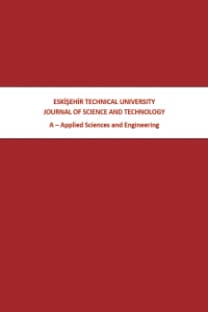EFFECT OF RIVETING ON THE JOINT STRENGTH OF ADHESIVELY BONDED DOUBLE LAP JOINTS
The scope of this study, is to determine the effectiveness of using rivets in the adhesive joints in order to combine plastic based composite materials which are often used in today's engineering structures, to the joint strength. For this purpose, double lap joints are prepared in 3 different types of configuration included adhesive, pinned and both adhesive and pinned and also prepared in 3 different overlap lengths as 30, 45 and 60 mm. Stress-strain diagrams were derived by exposing the joints obtained, to the axial tensile test and then the most appropriate joint type was determined by comparing each of the results obtained. The evaluation of the results pointed out that the hybrid joints where adhesive and rivet are used together, can carry much more load than the joints where only adhesive was used or the joints which are combined with rivet in terms of joint strength.
Keywords:
Double lap joint, Adhesive Rivet, Overlap length, ANSYS,
___
- [1] Custo´ dio J., Broughton J., Cruz H., A review of factors influencing the durability of structural bonded timber joints, International Journal of Adhesion & Adhesives 29 (2009) 173– 185.
- [2] Chang-Su Ban, Young-Hwan Lee, Jin-Ho Choi, Jin-Hwe Kweon, Strength prediction of adhesive joints using the modified damage zone theory, Composite Structures 86 (2008) 96–100.
- [3] Choi JH, Lee DG. An experimental study of the static torque capacity of the adhesively-bonded tubular single lap joint. J Adhesion 1996; 55:245–60.
- [4] Adams RD, Comyn J, Wake WC., Structural adhesive joints in engineering. London: Chapman & Hall;1997.
- [5] M. Arenas J., J.Narbo´n J., Alı´ C., Optimum adhesive thickness in structural adhesives joints using statistical techniques based on Weibull distribution, International Journal of Adhesion & Adhesives 30 (2010) 160–165.
- [6] Reis PNB, Antunes FJV, Ferreira JAM. Compos Struct 2004;67:125.
- [7] S.M.R. Khalili, S. Khalili, M.R. Pirouzhashemi, A. Shokuhfar, R.K. Mittal, Numerical study of lap joints with composite adhesives and composite adherends subjected to in-plane and transverse loads, International Journal of Adhesion & Adhesives 28 (2008) 411– 418.
- [8] Goglio L., Rossetto M., Precision of the one-dimensional solutions for bonded double lap joints, International Journal of Adhesion and Adhesives 31 (2011) 301-314.
- [9] Park Y-B., Song M-G., Kim J-J., Kweon J-H, Choi J-H., Strength of carbon/epoxy composite single-lap bonded joints in various environmental conditions, Composite Structures 92 (2010) 2173–2180.
- [10] Harris JA, Adams RD. Strength prediction of bonded single lap joints by nonlinear finite element method. Int J Adhes Adhes 1984;4:65–78.
- [11] Hart-Smith LJ. Adhesive-bonded double-lap joints. NASA CR-112235. National Aeronautics and Space Administration; 1973.
- [12] Tong L. Bond strength for adhesive-bonded single-lap joints. Acta Mech 1996;117:101–13.
- [13] Tong L. Strength of adhesively bonded single-lap and lap-shear joints. Int J Solids Struct 1998; 35:2601–16.
- [14] Suo Z, Hutchinson JW. Interface crack between two elastic layers. Int J Fract 1990;43:1–18.
- [15] Kafkalidis MS, Thouless MD. The effects of geometry and material properties on the fracture of single lap-shear joints. Int J Solids Struct 2002; 39:4367–83.
- [16] Lai YH, Rakestraw MD, Dillard DA. Cracked lap shear specimen revisited – a closed form solution. Int J Solids Struct 1996; 33:1725–43.
- [17] Shahin K., Taheri F., Deformations in adhesively bonded joints on elastic foundations, Composite Structures 90 (2009) 130–140.
- [18] Song M.-G., Kweon J.-H, Choi J.-H., Byun J.-H., Song M.-H., Shin S.-J., Lee T.-J., Effect of manufacturing methods on the shear strength of composite single-lap bonded joints, Composite Structures 92 (2010) 2194–2202.
- [19] Apalak ZG, Apalak MK. Progressive damage modeling of and adhesively bonded unidirectional composite single-lap joint in tension at the mesoscale level. J Thermoplast Compos Mater 2006; 19:671–702.
- [20] İçten BM, Oktan B, Karakuzu R. Failure strength of woven glass fiber-epoxy Composites Pinned Joints. Journal of Composite Materials 37 (2003); 1337-1350.
- ISSN: 2667-4211
- Yayın Aralığı: Yılda 4 Sayı
- Başlangıç: 2000
- Yayıncı: Eskişehir Teknik Üniversitesi
